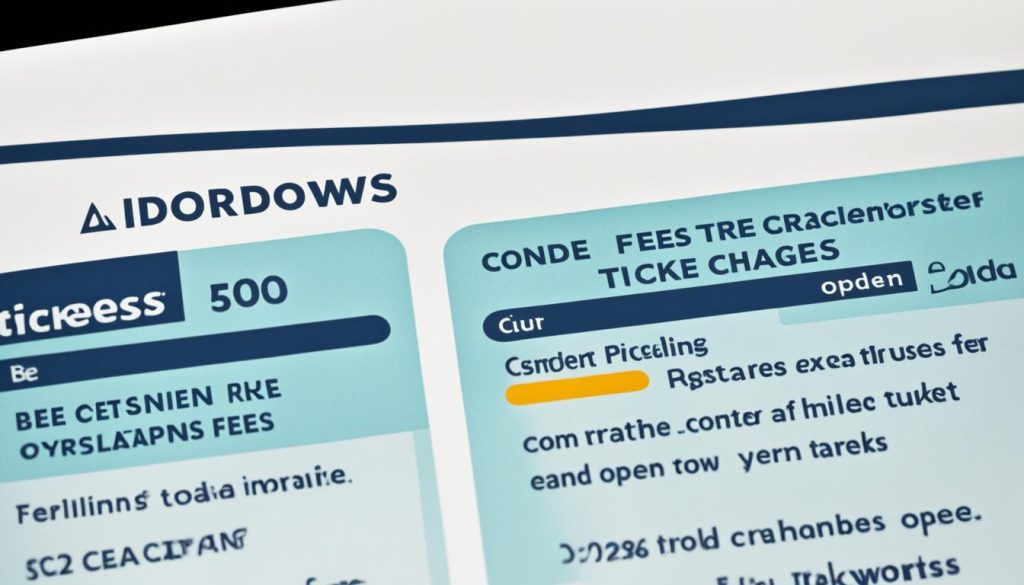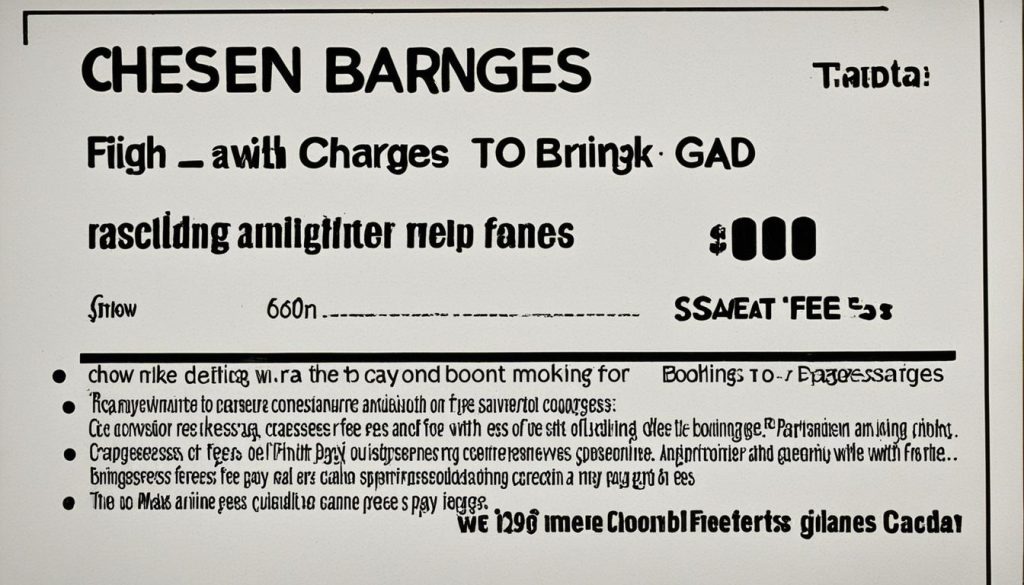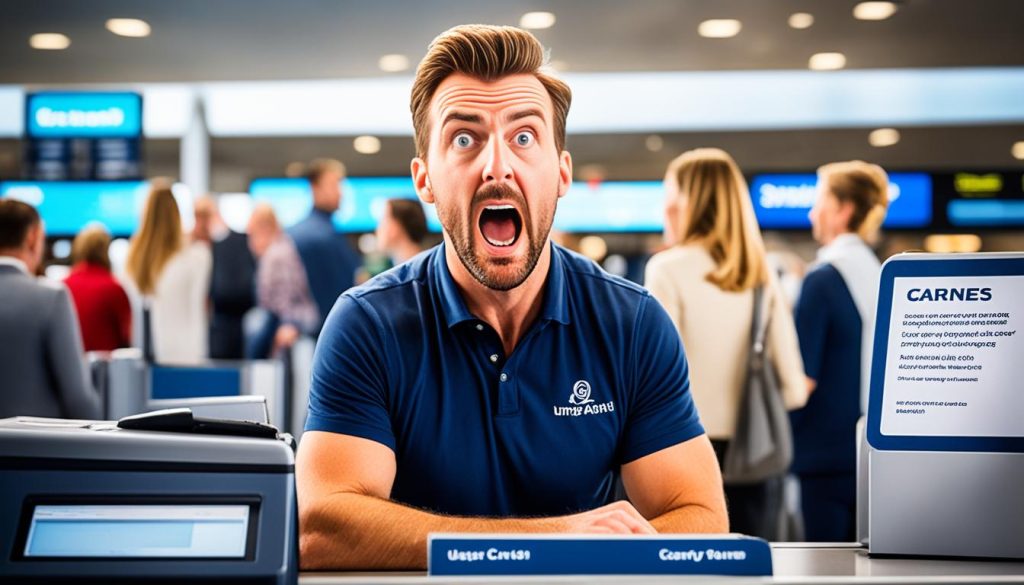Have you ever felt surprised by extra fees on your airline ticket? These fees, like charges for bags or seat choices, keep growing. Airlines say these fees give you more options, but they can make your ticket price jump. This often surprises people who didn’t expect these costs1.
Airlines make a lot of money from these hidden fees, bringing in billions each year. Baggage fees alone added over $3.3 billion to the U.S. aviation industry’s earnings last year1. In 2011, U.S. airlines made $2.38 billion from fees for changing reservations, says the Bureau of Transportation Statistics1.
But there’s more. Airlines like Spirit and Allegiant now charge for carry-on bags1. Most airlines also add fees for paying with credit or debit cards1. These fees can be as much as $6 to $8.60 for some budget airlines1. Even big airlines like British Airways and Air France charge $7 for card payments1.
It’s important to know about these hidden fees to avoid extra costs. As airlines keep finding new ways to charge, it’s up to you to stay informed. This way, you can travel without unexpected surprises.
Key Takeaways
- Airline hidden fees have become a significant revenue stream, with baggage fees alone generating over $3.3 billion annually.
- Budget airlines are increasingly charging for basic services like carry-on bags and credit/debit card payments.
- Legacy carriers are also adding surcharges for credit card usage, further increasing the final cost of travel.
- Airlines argue these fees provide more choice, but consumers view them as excessive and unfairly sprung on travelers at the end of the booking process.
- Staying informed about hidden charges is crucial for passengers to avoid unexpected costs and travel more cost-effectively.
The Billion-Dollar Baggage Fee Saga
Airlines have turned baggage fees into a big money-maker, bringing in over $3.3 billion a year for U.S. airlines2. Most major airlines now charge for checked bags, and some even take money for carry-on luggage2. This has made many passengers upset, seeing these fees as too high for a basic service2.
Baggage Fees: A Growing Revenue Stream
Airlines say these fees give customers more options and flexibility. But critics argue the charges are unfair and the weighing systems are not always reliable2. Reports show that Frontier Airlines staff get bonuses for making customers pay extra if their carry-on is too big2.
The costs can add up fast. American Airlines charges $30 for the first bag on domestic flights, going up to $200 for the fourth2. JetBlue charges $35 for the first bag, $45 for the second, and $150 for the third2. Priority boarding fees also vary a lot, with Frontier Airlines charging between $6-$12, American Airlines up to $74, and JetBlue starting at $102.
Airlines are making more money by charging for extra services like online check-ins or printing boarding passes, with fees from $5 to $352. Changing trip details can also cost a lot, with Spirit Airlines charging $40 for name changes, and Frontier Airlines and JetBlue both charging $752.
Cancelling or changing flights has become a big money-maker too, with airlines making an extra $700 million from these fees last year2. American Airlines charges $200 to cancel a domestic flight and $750 for an international one2.
The airline industry’s focus on baggage fees and other extra charges is causing a big stir with consumers2. They feel they’re being asked to pay too much for basic services2. As airlines look for more ways to make money, travelers need to keep up and watch out for unexpected fees that can really add to the cost of flying2.
Seat Selection Charges: Paying for Preferred Seating
Air travel has changed a lot, especially with the rise of seat selection fees. Now, many airlines charge extra for choosing specific seats. This change has upset some passengers, like families who have to pay more to sit together3.
Airlines say these advance seat assignment fees give customers more control over their seats. But, critics see them as a way for airlines to make more money3.
How much you pay for a seat depends on the flight length and the type of seat you want. Window and aisle seats usually cost more3. But, a middle seat might not cost extra3.
Airlines offer different seats and fees to meet passengers’ needs. For example, preferred seating is free for some American Airlines members from the start3. Main Cabin Extra seats with more room and perks are free for top-tier members on American3.
| Airline | Seat Selection Fees |
|---|---|
| Alaska Airlines | Least among major airlines4 |
| Hawaiian Airlines | Least among major airlines4 |
| Frontier Airlines | Most among major airlines4 |
| Spirit Airlines | Most among major airlines4 |
Airlines use “drip pricing” to show more fees and increase prices4. Some offer “premium economy” fares that might get you better seats if you skip seat selection4.
Seat selection fees can be frustrating, but knowing airline policies helps. By being informed, you can save money and enjoy your flight more5.
“Checking in online precisely 24 hours before the flight increases the chances of being seated with a travel companion for free about 95% of the time.”5
In conclusion, seat selection fees are now a big part of airline profits. By understanding airline policies, you can manage these fees better and save money345.
Credit and Debit Card Surcharges: The Hidden Cost of Convenience
Many airlines add extra fees when you book flights with credit or debit cards. These “payment surcharges” can be $6 to $8 per transaction. Consumers see these fees as unfair6. Airlines say these fees help cover their costs, but consumer groups think they’re too high.
Credit card surcharges have become a big money-maker for businesses6. In 2022, 80% of card users said they paid a surcharge6. That year, U.S. merchants paid about $160 billion in processing fees, mostly from credit cards6. Also, 5-10% of small businesses in the U.S. add a surcharge to credit card purchases6. About 15% of new businesses start with a surcharge policy6.
But don’t worry, surcharging is legal in most states6. The rules change by state. In Colorado, surcharges can’t be more than 2% of the purchase or the payment processor’s fee6. In New York, businesses must show both cash and credit prices6. But, surcharging is banned in Connecticut, Maine, Massachusetts, Oklahoma, and Puerto Rico6.
To dodge these surcharges, use debit cards, prepaid cards, cash, check, or ACH direct bank transfer6. Businesses might set lower surcharge rates to keep customers happy and avoid losing sales6. Yet, surcharging can make customers buy less and choose other options6.
Credit card surcharges are different from convenience fees. Convenience fees help cover the cost of card-not-present transactions and let you choose between credit and debit6. As airlines try to stay profitable7, the debate over credit and debit card fees will likely continue6.
“While there are benefits to surcharging, it may lead to smaller average ticket sizes and lost customers due to consumer reluctance to pay additional fees.”6
In conclusion, the rise of surcharges on credit and debit cards shows the hidden costs of convenience in flying. Knowing the laws and how to avoid these fees helps travelers save money678.,,
Is Your Airline Hiding Fees? The Truth About Extra Charges
Airlines say they’re more open about their fees, but it’s hard for passengers to grasp the real cost of flying9. Fees for bags went up from $4.9 billion to $6.8 billion from 2018 to 20229. Seat fees added another $4.2 billion in 20229. Yet, airlines are fighting the DOT over fee rules9, showing they don’t want more openness.
The DOT has made new rules to help with this10. Airlines and ticket agents must show fees along with the ticket price10. This should help travelers avoid surprise fees and make better choices10. But, airlines have different times to start following these rules, from six months to two years11. So, it might still be hard for consumers to know the full cost of their flights.
Looking at fees, it’s a complex world9. Alaska Airlines’ Saver fares don’t allow changes, but others don’t have a change fee9. Allegiant Air charges up to $75 per person for changes without Trip Flex9. American Airlines’ seat selection costs between $4 to $2809, and Delta charges at least $35 for the first bag on domestic flights9. Frontier Airlines has a $99 cancellation fee for basic fares9, and Hawaiian charges $15 to $40 for the first bag9. JetBlue’s Blue Basic passengers pay $35 for the first bag9, and Southwest doesn’t charge for carry-on or the first two checked bags9. Spirit Airlines starts at $39 for carry-ons and $34 for the first checked bag9, and United’s Basic Economy passengers face restrictions on luggage and changes.
This shows we need more openness and protection from airlines10. Consumers pay $543 million too much in fees each year because of hidden charges10. The DOT’s new rules aim to fix this11. With the DOT working to protect consumers, travelers can look forward to a more open airline industry.

The airline industry is under the spotlight for its fees, and it’s crucial for consumers to keep up and stand up for their rights. By understanding airline fees and the push for more openness, travelers can make better choices and avoid hidden charges.
Change and Cancellation Fees: The Cost of Flexibility
Navigating the Maze of Change and Cancellation Policies
Changing or canceling a flight can cost you a lot, from $0 to $400, based on the airline and route12. Airlines have different rules, making it hard for people to know what to expect. Some airlines, like United, have changed their rules to make it easier for customers. But others still charge a lot for making changes12.
United Airlines has updated its policies a lot. They don’t charge extra to change flights in the U.S. or to some other places anymore12. They also don’t charge a $200 fee to cancel a ticket. And, you can cancel any ticket for a full refund if you do it within 24 hours of buying it and more than a week before flying12. They also dropped the $75 fee for changing your flight on the same day12.
But, other airlines still charge a lot to change or cancel flights. It’s important to check the airline’s rules before booking to avoid surprise fees1213.
The U.S. Department of Transportation is making airline fees clearer, including for changes and cancellations1413. This could save consumers over half a billion dollars a year and give them clear info when they’re booking14.
As airlines change, it’s key for travelers to keep up with the latest on fees for changes and cancellations. This helps them make smart choices and avoid extra costs13.
“Navigating the maze of airline change and cancellation fees can be daunting, but with the right information, travelers can make the most of their airline flexibility.”
Knowing about airline fees for changes and cancellations helps travelers make smart choices. This can save them money if they need to change their plans121314.
Service Fees: Paying for Extras
Airlines now charge extra for services that used to be free. This includes fees for checking bags and picking seats. These charges add to the cost of flying15.
Domestic flights on American Airlines have a U.S. government tax of 7.5%. There’s also a $5.60 fee for the September 11th Security Fee per one-way trip. Plus, airport fees can be up to $18 roundtrip15. For flights to Hawaii or Alaska, the U.S. government tax is $8.90 per flight15. On international flights, the September 11th Security Fee is $5.60 per way, and PFCs can be up to $18. Other fees, like the U.S. government excise tax, can add up to $24015.
Airlines also charge extra for services that used to be free. Delta Airlines, for example, can charge up to $400 to change a flight15. Other fees include seat selection, baggage check, booking award tickets, phone help, carrying a bag on the plane, and printing boarding passes15.
To save money, travelers can use carry-on luggage, pick seats early, and bring their own food16. Knowing the fees of different airlines helps when booking flights16.
| Airline | Average Flight Cost Increase |
|---|---|
| Spirit Airlines | 736% |
| Frontier Airlines | 448% |
| Delta Air Lines | 158% |
| American Airlines | 95% |
Service fees greatly increase the cost of flying17. American Airlines is open about these charges. But Spirit and Frontier have much higher fees, making flights more expensive17. Knowing about these fees can help travelers save money17.

Minimizing Airline Fees: Strategies for Savvy Travelers
Airlines keep adding fees for services once given for free. Savvy travelers use smart strategies to dodge these extra costs and save money18. With 853 million passengers flying with U.S. airlines in 202218, it’s key to find ways to cut airline fees for the best value on flights.
Tips and Tricks for Avoiding Hidden Charges
One top tip is to check airline fees before you book18. Knowing what each airline charges helps you make better choices18. Also, booking directly with the airline can save you extra fees18.
Being flexible can also save you money18. Book early and consider off-peak times for big savings18. Use frequent flyer miles and loyalty perks for discounts or even free flights18.
Packing light helps avoid baggage fees18. Bringing your own snacks and drinks can also cut costs18. Look for discounts and sign up for airline newsletters to find savings18.
Using these smart tips, travelers can beat airline fees and save on their trips18. Being informed and proactive is the secret to getting the best deal on flights18.
https://tunekong.com/indoor-plants-101-the-best-green-companions-for-a-fresh-vibrant-home-16/
| Airline Fee Type | Average Cost |
|---|---|
| Checked Baggage | $2519 |
| Carry-on Baggage | $15 – $7519 |
| Seat Selection | $0 – $2319 |
| Boarding Pass Printing | $5 – $2519 |
| In-flight Meals and Drinks | $12 for meals, $16 for alcohol19 |
| In-flight WiFi | $8 per day (Southwest)19 |
“Researching airline fees before booking is recommended to factor costs into the decision-making process.”18
By using these strategies, smart travelers can dodge airline fees and save on their trips18. Whether it’s using loyalty programs, packing light, or choosing flexible travel dates, there are many ways to avoid extra charges and save money18.
Conclusion
Airline hidden fees and extra charges have become a big problem for travelers. They often make flights much more expensive20. Airlines say these fees give customers more choices. But, consumer groups think the charges are too high and catch passengers off guard.
It’s important to understand these hidden costs and find ways to reduce them. This helps travelers save money and book flights better20. Choosing airlines like Southwest that have lower fees for bags and seats can help. Also, using credit card benefits can offset some of these costs20. Keeping up with new rules and actions to make prices clearer and protect consumers is also key.
The airline industry is always changing. It’s up to travelers to stay alert and push for fair prices. This way, you can make sure your travel is both fun and doesn’t break the bank2122.
FAQ
What are some of the most common hidden fees and extra charges that airlines impose on passengers?
Airlines often charge for baggage, seat selection, credit/debit card fees, and change or cancellation fees. These fees can make the total cost of a flight much higher. They often surprise travelers.
Why have baggage fees become such a major revenue source for airlines?
Baggage fees have become a big money-maker for airlines, bringing in over .3 billion. Most airlines now charge for checked and carry-on bags. This has upset many who feel they’re paying extra for basic services.
Why are airlines charging passengers to select their seats?
Now, many airlines make you pay to pick your seat, a service once free. This has upset families who must pay to sit together. Airlines say it gives customers more choice, but critics see it as another unnecessary fee.
Why do airlines tack on additional fees for using credit or debit cards?
Airlines add “payment surcharges” when you use credit or debit cards to book flights, costing to per transaction. They say it covers processing costs. But, consumer groups think these fees are too high and unfair.
Are airlines being transparent about their fees and charges?
Airlines claim they’re more open about fees than ever, listing all charges on their websites. Yet, consumer groups say the many extra fees and their complexity still make it hard for passengers to know the real flight cost. They call for more transparency from airlines.
How can travelers minimize the impact of airline hidden fees and extra charges?
To reduce the effect of airline fees, travelers can pick airlines with better policies, use loyalty program benefits, and only choose services they really need. Being well-informed helps avoid unexpected costs and get the best deal on flights.

